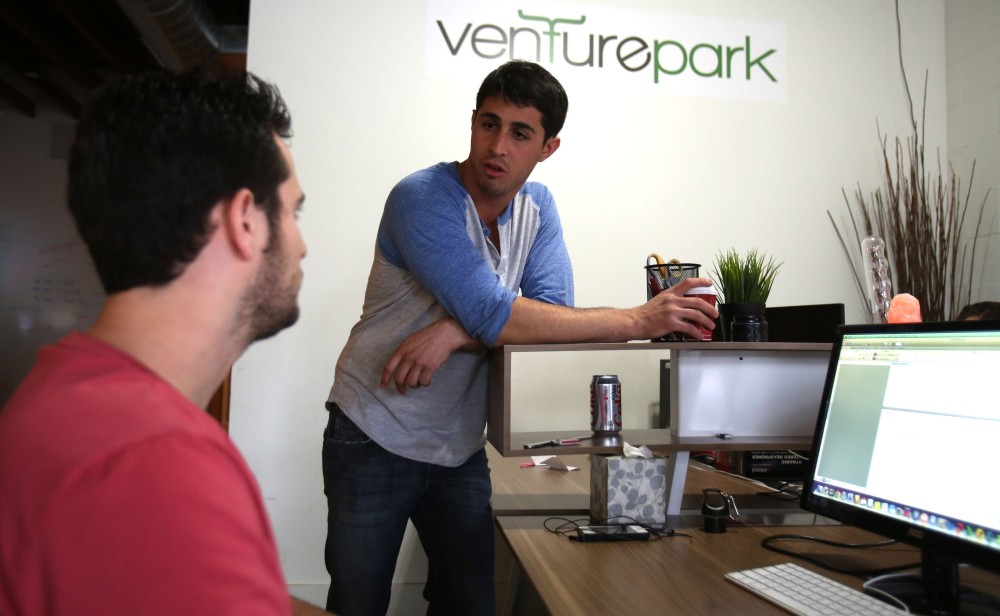By Frank Witsil
Detroit Free Press
For years, Rob Cousineau and his partners operated their video editing company, Get Super Rad, from their homes.
Earlier this year, they decided a more grown-up place was in order and moved to Venture Park, a shared working space in Royal Oak, Mich.
They wanted the benefits and amenities of an office without the high cost or long-term commitment so they could work around other young, creative entrepreneurs.
The co-working space, which was a hotel years ago, offers a variety of options, from small enclosed offices with lofts to what looks like a table at a coffee shop. In fact, in one large room, Venture Park is building a coffee bar to create a social atmosphere.
“You ever talk to people who are so excited about what they are doing it inspires you?” Cousineau, 30, asked.
“That’s what it’s like to work at Venture Park.”
The trend of co-working putting several, small independent companies and professionals under the same roof has been growing the past five years.
It has been driven largely by technology, enterprising 20-somethings, and, in some cases, workers who started small businesses or started to freelance after being downsized.
Deskmag, an online magazine about co-working, publishes an annual Global Co-working Survey that estimated there are more than 110,000 people working in nearly 2,500 spaces worldwide, an increase of 83 percent from last year.
“In some ways this is a trend of going back to the workplace,” said Margaret Williams, the interim dean of Wayne State University’s School of Business Administration.
“A lot of it is driven by the millennial generation and their affinity for social connections.”
Co-working allows entrepreneurs who might otherwise toil alone at home or set up temporary digs at a coffee shop table to have a permanent business address, access to a conference room and also to socialize with office mates.
“Co-working is all about bringing flexibility to an office, and that appeals to entrepreneurs,” said Derek Turner, director of business development at Grand Circus in Detroit.
Grand Circus, which opened this year, offers about 40 offices on a daily, weekly and monthly rate. “They don’t always know where their company will be in two years.”
At the same time, co-working helps separate personal and professional spaces, said Todd Luhtanen, the founder of Metro Work Spaces in Livonia, Mich.
One entrepreneur, he said, even opened an office there at his wife’s request. Luhtenan said an office lends a small business gravitas and credibility.
“You do not want to bring someone into your basement, den or living room for a meeting,” he said.
Jacob Zuppke, a managing partner of Venture Park, said he and his partners stumbled on the space they are developing now when seeking offices for his digital marketing agency, Traffic Digital Agency.
“We were looking for office space last summer and we got really lucky,” he said.
Zuppke, 25, and his partners are transforming a Royal Oak building that has about 10,000 square feet.
The spaces rent on a month-to-month basis with utilities, and amenities such as hot coffee are included.
Venture Park also offers professional services, such as access to attorneys, at a discounted rate.
Still, Cousineau said, even though they moved into an office, they didn’t want it to feel like one.
To keep it fun, they hung a stuffed wild boar head wearing a cap on the wall, and they’ve covered the shelves with action figures and other toys from their youth.
“It’s good to be surrounded by forward-thinking people,” he said.
“It makes work fun.”
Deskmag, which compiled a timeline of co-working spaces, said the first official co-working space opened in 2005 in San Francisco.
That space, the magazine said, was started by a programmer, Brad Neuberg, who was seeking an alternative to the home office.
In a blog, Neuberg described the space as a “new kind of work environment for free spirits.”
It offered five to eight desks for two days a week, along with amenities such as Wi-Fi, shared lunches, meditation breaks and bike tours.
In 2012, the magazine asked in an online survey for words to describe how people felt about being in these shared spaces.
The most popular responses were: fun, friendly, creative, inspiring, productive, flexible, social and collaborative.














































































































































































































































































































































































